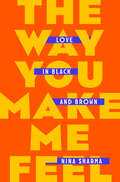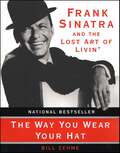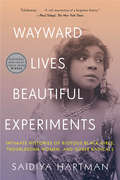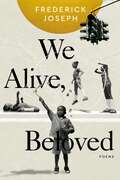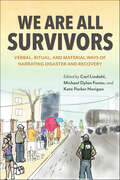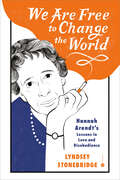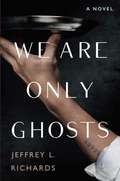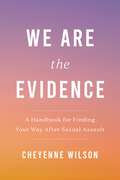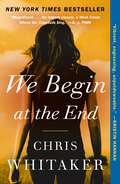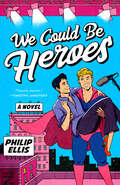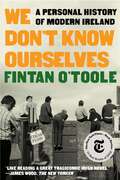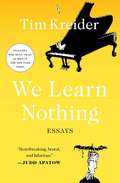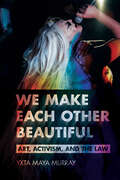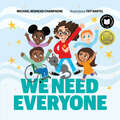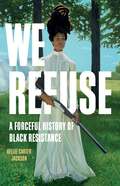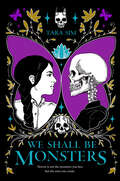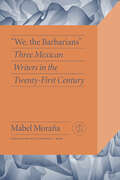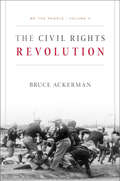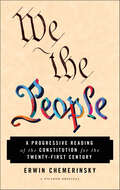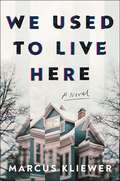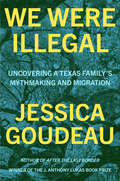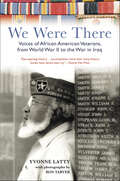- Table View
- List View
The Way You Love Me: A Grayson Friends Novel (The Grayson Friends Novels #1)
by Francis RayNothing gets to Shane Elliott. A former Army Ranger, now head of security for a wealthy real estate tycoon, Shane can handle whatever life throws at him—until he meets the beautiful, kindhearted Paige Albright. She's about to inherit a fortune, and Paige's mother has asked Shane to investigate her boyfriend. It should have been a simple, standard assignment for Shane…if only Paige's seductive mix of strength and vulnerability didn't leave him wanting her for himself.All her life, Paige has put others' needs before her own, even going so far as choosing a man to please her father. Now her mother's mysterious houseguest is tempting her to go after what she truly wants…even if it's the cool, assertive, irresistible Shane himself. But is he who he appears to be? And how can Paige know whether to trust her own judgment—and their red-hot attraction?
The Way You Make Me Feel: Love in Black and Brown
by Nina Sharma&“Remarkable . . . The Way You Make Me Feel affirms that Black and Brown existence in America comes with no guarantee of collective solidarity, no innate promise of racial equality. The path to justice is uncertain, Sharma reminds us, and we must each work hard—and be bold enough to sacrifice our own comfort—to actualize it.&” —Washington PostA hilarious and moving memoir in essays about love and allyship, told through one Asian and Black interracial relationshipWhen Nina Sharma meets Quincy while hitching a ride to a friend&’s Fourth of July barbecue, she spots a favorite book, Maxine Hong Kingston&’s The Woman Warrior, in the back seat of his cramped car, and senses a sadness from him that&’s all too familiar to her. She is immediately intrigued—who is this man? In The Way You Make Me Feel, Sharma chronicles her and Quincy&’s love story, and in doing so, examines how their Black and Asian relationship becomes the lens through which she moves through and understands the world.In a series of sensual and sparkling essays, Sharma reckons with caste, race, colorism, and mental health, moving from her seemingly idyllic suburban childhood through her and Quincy&’s early sweeping romance in the so-called postracial Obama years and onward to their marriage. Growing up, she hears her parents talk about the racism they experienced at the hands of white America—and as an adult, she confronts the complexities of American racism and the paradox of her family&’s disappointment when she starts dating a Black man. While watching The Walking Dead, Sharma dives into the eerie parallels between the brutal death of Steven Yeun&’s character and the murder of Vincent Chin. She examines the trailblazing Mira Nair film Mississippi Masala, revolutionary in its time for depicting a love story between an Indian woman and a Black man on screen, and considers why interracial relationships are so often assumed to include white people. And as she and Quincy decide whether to start a family, they imagine a universe in which Vice President Kamala Harris could possibly be their time-traveling daughter.Written with a keen critical eye and seamlessly weaving in history, pop culture, and politics, The Way You Make Me Feel reaffirms the idea that allyship is an act of true love.
The Way You Wear Your Hat: Frank Sinatra and the Lost Art of Livin'
by Bill ZehmeIn The Way You Wear Your Hat, author Bill Zehme presents a masterful assembly of the most personal details and gorgeous minutiae of Frank Sinatra's way of livingmatters of the heart and heartbreak, friendship and leadership, drinking and cavorting, brawling and wooing, tuxedos and snap-brimsall crafted from rare interviews with Sinatra himself as well as many other intimates, including Tony Bennett, Don Rickles, Angie Dickinson, Tony Curtis, and Robert Wagner, in addition to daughters Nancy and Tina Sinatra. Capturing the timeless romance and classic style of the fifties and the loose sixties, The Way You Wear Your Hat is a stunning exploration of the Sinatra mystique.
Wayward Lives, Beautiful Experiments: Intimate Histories Of Social Upheaval
by Saidiya HartmanWinner of the 2019 National Book Critics Circle Award in Criticism Winner of the PEN/John Kenneth Galbraith Award for Nonfiction Winner of the 2020 Judy Grahn Award for Lesbian Nonfiction Finalist for the Lambda Literary Award for Lesbian Memoir/Biography "Exhilarating…A rich resurrection of a forgotten history." —Parul Sehgal, New York Times Beautifully written and deeply researched, Wayward Lives, Beautiful Experiments examines the revolution of black intimate life that unfolded in Philadelphia and New York at the beginning of the twentieth century. In wrestling with the question of what a free life is, many young black women created forms of intimacy and kinship indifferent to the dictates of respectability and outside the bounds of law. They cleaved to and cast off lovers, exchanged sex to subsist, and revised the meaning of marriage. Longing and desire fueled their experiments in how to live. They refused to labor like slaves or to accept degrading conditions of work. Here, for the first time, these women are credited with shaping a cultural movement that transformed the urban landscape. Through a melding of history and literary imagination, Wayward Lives, Beautiful Experiments recovers these women’s radical aspirations and insurgent desires.
We Alive, Beloved
by Frederick JosephNYT Bestselling Author, Frederick Joseph, explores a new genre in this captivating poetry collection that seeks to find joy in moments of difficulty whether through illuminating the beauty of being Black, highlighting the hope that can be found in childhood, or by sharing intimate truths revealed on a mental health journey. This book will appeal to both new and established readers of poetry.Step into the world of We Alive, Beloved, where its words will resonate within the deepest corners of your soul, leaving a mark on your heart and a renewed appreciation for the beauty of being alive. We Alive, Beloved moves beyond being a poetry collection; it's a celebration of the profound aspects of our existence. Each poem seeks to immortalize the fleeting moments of joy, love, resilience, and inspiration that often slip through the grasp of our fast-paced lives. In this poetic testament, we defy the ephemeral nature of beauty and goodness, daring to clutch onto these facets of life for just a little longer. With words that stand as guardians against the relentless march of time and the ceaseless tides of change, trauma, and grief, this collection becomes a sanctuary of light in a world that sometimes seems dim. We Alive, Beloved explores a rich tapestry of themes, from the intricacies of relationships and the heartache of loss, to the wide-eyed wonder of existence and the challenges of exploring the possibility of parenthood in our modern age. Each poem reaches out to readers, offering a mirror to their own journeys and emotions, inviting them to be seen and acknowledged in its lyrical embrace.
We Are All Survivors: Verbal, Ritual, and Material Ways of Narrating Disaster and Recovery
by Carl Lindahl, Michael Dylan Foster and Kate Parker HoriganWhat is the role of folklore in the discussion of catastrophe and trauma? How do disaster survivors use language, ritual, and the material world to articulate their experiences? What insights and tools can the field of folkloristics offer survivors for navigating and narrating disaster and its aftermath? Can folklorists contribute to broader understandings of empathy and the roles of listening in ethnographic work?We Are All Survivors is a collection of essays exploring the role of folklore in the wake of disaster. Contributors include scholars from the United States and Japan who have long worked with disaster-stricken communities or are disaster survivors themselves; individual chapters address Hurricane Katrina, Hurricane Maria, and two earthquakes in Japan, including the earthquake, tsunami, and nuclear disaster of 2011. Adapted from a 2017 special issue of Fabula (from the International Society for Folk Narrative Research), the book includes a revised introduction, an additional chapter with original illustrations, and a new conclusion considering how folklorists are documenting the COVID-19 pandemic.We Are All Survivors bears witness to survivors' expressions of remembrance, grieving, and healing.
We Are Free to Change the World: Hannah Arendt's Lessons in Love and Disobedience
by Lyndsey StonebridgeA timely guide on how to live—and think—through the challenges of our century drawn from the life and thought of political theorist Hannah Arendt, one of the twentieth century&’s foremost opponents of totalitarianism&“We are free to change the world and to start something new in it.&”—Hannah ArendtThe violent unease of today&’s world would have been familiar to Hannah Arendt. Tyranny, occupation, disenchantment, post-truth politics, conspiracy theories, racism, mass migration: She lived through them all.Born in the first decade of the last century, she escaped fascist Europe to make a new life for herself in America, where she became one of its most influential—and controversial—public intellectuals. She wrote about power and terror, exile and love, and above all, about freedom. Questioning—thinking—was her first defense against tyranny. She advocated a politics of action and plurality, courage and, when necessary, disobedience.We Are Free to Change the World is a book about the Arendt we need for the twenty-first century. It tells us how and why Arendt came to think the way she did, and how to think when our own politics goes off the rails. Both a guide to Arendt&’s life and work, and its dialogue with our troubled present, We Are Free to Change the World is an urgent call for us to think, as Hannah Arendt did—unflinchingly, lovingly, and defiantly—through our own unpredictable times.
We Are Not Able to Live in the Sky: The Seductive Promise of Microfinance
by Mara Kardas-NelsonA deeply reported work of journalism that explores the promises and perils of microfinance, told through the eyes of international lenders and women borrowers in West AfricaIn the mid-1970s, Muhammad Yunus, an American trained Bangladeshi economist, met a poor female stool maker who needed money to expand her business. In an act widely known as the beginning of microfinance, Yunus lent $27 to forty-two women, hoping small credit would help the women pull themselves out of poverty. Soon, Yunus’s Grameen Bank was born, and the idea of giving very small, high-interest loans to poor people took off. In 2006, Yunus and the Grameen Bank won the Nobel Peace Prize for “efforts to create economic and social development from below.”But there’s a problem with this story. There are mounting concerns that these small loans are as likely to bury poor people in debt as they are to pull them from poverty, with borrowers from India to Kenya facing consequences such as jail time and forced land sales. Reportedly hundreds have even committed suicide.What happened? Did microfinance take a wrong turn, or was it flawed from the beginning? Mara Kardas-Nelson’s We Are Not Able to Live in the Sky is about unintended consequences, blind optimism, and the decades-long ramifications of seemingly small policy choices. The book is rooted in the stories of women borrowers in Sierra Leone, West Africa. Their narratives, woven through a deep history of modern international development, are set against the rise of Yunus’s vision that tiny loans would “put poverty in museums.” Kardas-Nelson asks: What is missed with a single, financially focused solution to global inequity that ignores the real drivers of poverty? Who stands to benefit and, more important, who gets left behind?
We Are Only Ghosts: A Remarkable Novel of Survival in the Wake of WWII
by Jeffrey L. RichardsAn extraordinary, emotionally intense novel spanning World War II Europe to 1960s New York City with an unsettling psychological edge, We Are Only Ghosts depicts not only the horrors of the death camps but the toll on those who survived—powered by a story of the unexpected, complicated connection between a Nazi officer and a young Jewish boy. &“Told from the important and often overlooked perspective of a young gay man imprisoned in the Nazi concentration camps, We Are Only Ghosts evocatively portrays how the things that happen to us, both tragic and beautiful, shape who we are, and how we have the power to choose who we become in spite of our suffering. This gripping testament to the strength of the human spirit will both haunt and inspire you.&” —Ellen Marie Wiseman, New York Times Bestselling Author of The Lost Girls of Willowbrook New York City, 1968: The customers at Café Marie don&’t come just for the excellent coffee and pastries. They come for the sophisticated ambiance, and the illusion of being somewhere other than a bustling, exhausting city. Headwaiter Charles Ward helps create that illusion through impeccable service—unobtrusive, nearly invisible, yet always watchful. It&’s a skill Charles honed as a young Jewish boy in war-torn Europe, when avoiding attention might mean the difference between life and death. But even then, one man saw him all too clearly—a Nazi officer who was both his savior and tormentor. At seventeen, Charles was deported to Auschwitz with his family. There he was singled out by Obersturmführer Berthold Werden, who hid him in his home. Their entanglement produced a tortured affection mixed with hatred that flares to life again, decades later, when Berthold walks into Café Marie. Drawn back into Berthold&’s orbit, Charles is forced to revisit the pain and the brief, undeniable pleasures of the life he once knew. And if he acts on his growing hunger for revenge, will he lose his only tether to the past—the only other witness to who he was and everything he endured—or find peace at last?&“I was mesmerized by this gorgeously written novel that explores the psychological cost of survival with unflinching honesty and unwavering compassion. A young survivor of the Holocaust who crosses borders, decades, and identities in an attempt to leave behind his horrific past learns he will never be whole again until he finds the courage to confront his ghosts. An astounding story that will linger in my mind and heart for years to come, We Are Only Ghosts will take you on a riveting journey through unimaginable loss and corrupted love toward its ultimate destination of healing and repair.&” —Kim van Alkemade, New York Times Bestselling Author of Counting Lost Stars &“Profound, moving, and absolutely timely, We Are Only Ghosts shows how our identity determines destiny. Charles is gay, Czech, Jewish; as a teenager, he was ghettoized and subjected to the depravity of the Third Reich. In adulthood he discovers the courage to confront the ghosts who return to haunt him, including that of the boy he himself had once been. I&’m still pondering the questions posed by this touching novel.&” —William di Canzio, Author of Alec
We Are the Evidence: A Handbook for Finding Your Way After Sexual Assault
by Cheyenne WilsonA necessary, reassuring guide for all sexual assault survivors in need of immediate emotional and legal support post assault, and in the months and years after.We Are the Evidence is the first comprehensive resource for survivors of sexual assault. Written with conviction and compassion by Cheyenne Wilson, a registered nurse and survivor of sexual assault, this handbook contains everything victims and advocates need to know to navigate the tumultuous times that follow an assault. Within, there's advice for: The appropriate steps to take immediately after an assault Disclosing your assault how and when you choose How to pursue justice and navigate the legal system Beginning the healing process and reclaiming your power Throughout, you'll find exercises, opportunities to rest, and invaluable guidance from experts like attorneys, detectives and therapists. Voices from other sexual assault survivors also lend their support. Meant to be easily accessible, everything is organized for you to go right to the topic you most need guidance for, no matter where you are on your healing journey. You deserve to be heard, believed, and supported.
We Begin at the End
by Chris WhitakerWinner of the Gold Dagger for Best Crime Novel from the Crime Writers’ Association (UK)Winner for Best International Crime Fiction from Australian Crime Writers AssociationAn Instant New York Times Bestseller“A vibrant, engrossing, unputdownable thriller that packs a serious emotional punch. One of those rare books that surprise you along the way and then linger in your mind long after you have finished it.”—Kristin Hannah, #1 New York Times bestselling author of The Nightingale and The Four WindsRight. Wrong. Life is lived somewhere in between.Duchess Day Radley is a thirteen-year-old self-proclaimed outlaw. Rules are for other people. She is the fierce protector of her five-year-old brother, Robin, and the parent to her mother, Star, a single mom incapable of taking care of herself, let alone her two kids.Walk has never left the coastal California town where he and Star grew up. He may have become the chief of police, but he’s still trying to heal the old wound of having given the testimony that sent his best friend, Vincent King, to prison decades before. And he's in overdrive protecting Duchess and her brother.Now, thirty years later, Vincent is being released. And Duchess and Walk must face the trouble that comes with his return. We Begin at the End is an extraordinary novel about two kinds of families—the ones we are born into and the ones we create.
We Came Here to Shine: A Novel
by Susie Orman SchnallSet at the iconic 1939 New York World’s Fair, Susie Orman Schnall's We Came Here to Shine is historical fiction featuring two bold and ambitious women who navigate a world of possibility and find out what they're truly made of during a glorious summer of spectacle and potential.“An ode to female friendship that pulses with momentum and left me breathless.” —Fiona Davis, national bestselling author of The Chelsea Girls“A remarkable novel about the challenges women face and the courage they must summon in order to lead the lives they deserve." —Lynda Cohen Loigman, author of The Two-Family HouseGorgeous Vivi is the star of the Aquacade synchronized swimming spectacular and plucky Max is a journalist for the fair's daily paper. Both are striving to make their way in a world where men try to control their actions and where secrets are closely kept. But when Vivi and Max become friends and their personal and professional prospects are put in jeopardy, they team up to help each other succeed and to realize their dreams during the most meaningful summer of their lives. Perfect for fans of Taylor Jenkins Reid and Beatriz Williams, We Came Here to Shine is a story of ambition, friendship, and persistence with a fascinating behind-the-scenes look at the extraordinary NY World's Fair.
We Could Be Heroes
by Philip EllisNot all heroes wear capes. Some wear high heels and a wig.Patrick's acting career is on the rise, and the superhero movie he's filming might put him on the map . . . if the endless reshoots ever stop. Meanwhile, Will, a secondhand bookseller and part-time drag queen, is just trying to live his best life. After a chance encounter on a particularly chaotic night, a curious friendship sparks between the two men.At least, that&’s what they tell each other. Sure, Patrick finds Will captivatingly hilarious, and Will can&’t help but keep thinking about who is really behind the perfect mask Patrick shows the rest of the world, but nothing could ever really happen, right? Superheroes don&’t date drag queens, after all.When reality crashes into the fantasy world they&’ve built together, Will has to make a choice between the man of his dreams and being true to himself. Can Patrick be the hero Will&’s been waiting for, or will Will be the one to save Patrick after all? Uproarious and touching, We Could Be Heroes is an ode to queer joy and a romance that just might save the world.
We Don't Know Ourselves: A Personal History of Modern Ireland
by Fintan O'TooleNEW YORK TIMES BESTSELLER NEW YORK TIMES • 10 BEST BOOKS OF THE YEAR NATIONAL BESTSELLER The Atlantic: 10 Best Books of 2022 Best Books of the Year: Washington Post, New Yorker, Salon, Foreign Affairs, New Statesman, Chicago Public Library, Vroman's “[L]ike reading a great tragicomic Irish novel.” —James Wood, The New Yorker “Masterful . . . astonishing.” —Cullen Murphy, The Atlantic "A landmark history . . . Leavened by the brilliance of O'Toole's insights and wit.” —Claire Messud, Harper’s Winner • 2021 An Post Irish Book Award — Nonfiction Book of the Year • from the judges: “The most remarkable Irish nonfiction book I’ve read in the last 10 years”; “[A] book for the ages.” A celebrated Irish writer’s magisterial, brilliantly insightful chronicle of the wrenching transformations that dragged his homeland into the modern world. Fintan O’Toole was born in the year the revolution began. It was 1958, and the Irish government—in despair, because all the young people were leaving—opened the country to foreign investment and popular culture. So began a decades-long, ongoing experiment with Irish national identity. In We Don’t Know Ourselves, O’Toole, one of the Anglophone world’s most consummate stylists, weaves his own experiences into Irish social, cultural, and economic change, showing how Ireland, in just one lifetime, has gone from a reactionary “backwater” to an almost totally open society—perhaps the most astonishing national transformation in modern history. Born to a working-class family in the Dublin suburbs, O’Toole served as an altar boy and attended a Christian Brothers school, much as his forebears did. He was enthralled by American Westerns suddenly appearing on Irish television, which were not that far from his own experience, given that Ireland’s main export was beef and it was still not unknown for herds of cattle to clatter down Dublin’s streets. Yet the Westerns were a sign of what was to come. O’Toole narrates the once unthinkable collapse of the all-powerful Catholic Church, brought down by scandal and by the activism of ordinary Irish, women in particular. He relates the horrific violence of the Troubles in Northern Ireland, which led most Irish to reject violent nationalism. In O’Toole’s telling, America became a lodestar, from John F. Kennedy’s 1963 visit, when the soon-to-be martyred American president was welcomed as a native son, to the emergence of the Irish technology sector in the late 1990s, driven by American corporations, which set Ireland on the path toward particular disaster during the 2008 financial crisis. A remarkably compassionate yet exacting observer, O’Toole in coruscating prose captures the peculiar Irish habit of “deliberate unknowing,” which allowed myths of national greatness to persist even as the foundations were crumbling. Forty years in the making, We Don’t Know Ourselves is a landmark work, a memoir and a national history that ultimately reveals how the two modes are entwined for all of us.
We Learn Nothing: Essays and Cartoons
by Tim Kreider“Kreider locates the right simile and the pith of situations as he carefully catalogues humanity’s inventive and manifold ways of failing” (Publishers Weekly, starred review).In We Learn Nothing, satirical cartoonist Tim Kreider turns his funny, brutally honest eye to the dark truths of the human condition, asking big questions about human-sized problems: What if you survive a brush with death and it doesn’t change you? Why do we fall in love with people we don’t even like? How do you react when someone you’ve known for years unexpectedly changes genders? With a perfect combination of humor and pathos, these essays, peppered with Kreider’s signature cartoons, leave us with newfound wisdom and a unique prism through which to examine our own chaotic journeys through life. These are the conversations you have only with best friends or total strangers, late at night over drinks, near closing time. This edition also includes the sensationally popular essay “The Busy Trap,” as seen in the New York Times.
We Make Each Other Beautiful: Art, Activism, and the Law (Publicly Engaged Scholars: Identities, Purposes, Practices)
by Yxta Maya MurrayWe Make Each Other Beautiful focuses on woman of color and queer of color artists and artist collectives who engage in direct political action as a part of their art practice. Defined by public protest, rule-breaking, rebellion, and resistance to governmental and institutional abuse, direct-action "artivism" draws on the aims, radical spirit, and tactics of the civil rights and feminist movements and on the struggles for disability rights, queer rights, and immigrant rights to seek legal and social change. Yxta Maya Murray traces the development of artivism as a practice from the Harlem Renaissance to Yoko Ono, Judy Baca, and Marsha P. Johnson. She also studies its role in transforming law and society. We Make Each Other Beautiful profiles the work and lives of four contemporary artivists —Carrie Mae Weems, Young Joon Kwak, Tanya Aguiñiga, and Imani Jacqueline Brown—and the artivist collective Drawn Together, combining new oral histories with sharp analyses of how their diverse and expansive artistic practices bear important aesthetic and politicolegal meanings that address a wide range of injustices.
We Need Everyone
by Michael Redhead ChampagneEveryone has a gift. Every gift is different, and every gift is special. Our world needs you to share your gift.What is your gift? How can you use your gift to help others?We Need Everyone empowers children to identify their gifts and use them to overcome challenges, achieve goals, and strengthen communities. Inspiring and uplifting, this interactive picture book celebrates diverse cultures, perspectives, and abilities through playful illustrations. Perfect for reading aloud.
We Refuse: A Forceful History of Black Resistance
by Kellie Carter JacksonAn &“unsparing, erudite, and incisive&” (Jelani Cobb) reframing of the past and present of Black resistance—both nonviolent and violent—to white supremacy Black resistance to white supremacy is often reduced to a simple binary, between Dr. Martin Luther King Jr.&’s nonviolence and Malcolm X&’s &“by any means necessary.&” In We Refuse, historian Kellie Carter Jackson urges us to move past this false choice, offering an unflinching examination of the breadth of Black responses to white oppression, particularly those pioneered by Black women. The dismissal of &“Black violence&” as an illegitimate form of resistance is itself a manifestation of white supremacy, a distraction from the insidious, unrelenting violence of structural racism. Force—from work stoppages and property destruction to armed revolt—has played a pivotal part in securing freedom and justice for Black people since the days of the American and Haitian Revolutions. But violence is only one tool among many. Carter Jackson examines other, no less vital tactics that have shaped the Black struggle, from the restorative power of finding joy in the face of suffering to the quiet strength of simply walking away. Clear-eyed, impassioned, and ultimately hopeful, We Refuse offers a fundamental corrective to the historical record, a love letter to Black resilience, and a path toward liberation.
We Shall Be Monsters
by Tara SimFrankenstein meets Indian mythology in this twisty, darkly atmospheric fantasy where the real horrors are not the monsters you face, but the ones you create.&“One of the most unique and intelligent books I&’ve read. . . Alluring, completely enthralling, and masterfully rendered.&” —Axie Oh, New York Times bestselling author of The Girl Who Fell Beneath the SeaKajal knows she is not a good person. If she were, she wouldn&’t selfishly be risking her sister&’s soul in a dangerous bid to bring her back to life. She would let Lasya rest in peace—but Kajal cannot stand the horror of living without her.As Kajal prepares for the resurrection, the worst happens: Her sister&’s soul warps into a bhuta—a murderous, wraith-like spirit—and Kajal gets sentenced to death for her sister&’s rampage. There seems little hope of escape until two strangers offer to free her. The catch: She must resurrect the kingdom&’s fallen crown prince to aid a growing rebellion against a tyrannical usurper. Desperate, Kajal rushes to complete her end of the deal . . . only to discover that the boy she&’s resurrected, Tav, is not the crown prince.Now Kajal—prickly, proud, admirer of the scientific method—must team up with Tav—stubborn, reticent, and fonder of swords than of books—to find the real crown prince. With only a scalpel and her undead dog, Kutaa, at her side, Kajal must work fast before her mistake is exposed or Lasya&’s bhuta turns its murderous fury on the person truly responsible for her death: Kajal herself.
"We, the Barbarians": Three Mexican Writers in the Twenty-First Century (Critical Mexican Studies)
by Mabel Moraña&“We, the Barbarians&” embarks on a careful and exhaustive reading of three of the most prominent authors in the latest wave of Mexican fiction: Yuri Herrera, Fernanda Melchor, and Valeria Luiselli. Originally published in Mexico in 2021, this work is divided into three parts, one for each author&’s narrative production. The book analyzes all of the literary works published by Herrera, Melchor, and Luiselli from the beginning of their writing careers until 2021, allowing for a diachronic interpretation of their respective narrative projects as well as for comparative approaches to their aesthetic and ideological contours. Characterized by the fragmentation of civil society and the decomposition of the myths that accompanied the consolidation of the modern nation, Mexican visual and literary arts have explored a myriad of representational avenues to approach the phenomena of violence, institutional decay, and political instability. The critical and theoretical approaches in &“We, the Barbarians&” explore a variety of alternative symbolic representations of topics such as nationalism, community, and affect in times impacted by systemic violence, precariousness, and radical inequality. Moraña perceives the negotiations between regional/local imaginaries and global scenarios characterized by the devaluation and resignification of life, both at individual and collective levels. Though it uses three authors as its focus, this book seeks to more broadly theorize the question of the relationship between literature and the social in the twenty-first century.
We the People
by Bruce AckermanThe Civil Rights Revolution carries Bruce Ackerman’s sweeping reinterpretation of constitutional history into the era beginning with Brown v. Board of Education. From Rosa Parks’s courageous defiance, to Martin Luther King’s resounding cadences in “I Have a Dream,” to Lyndon Johnson’s leadership of Congress, to the Supreme Court’s decisions redefining the meaning of equality, the movement to end racial discrimination decisively changed our understanding of the Constitution.“The Civil Rights Act turns 50 this year, and a wave of fine books accompanies the semicentennial. Ackerman’s is the most ambitious; it is the third volume in an ongoing series on American constitutional history called We the People. A professor of law and political science at Yale, Ackerman likens the act to a constitutional amendment in its significance to the country’s legal development.”—Michael O’Donnell, The Atlantic“Ackerman weaves political theory with historical detail, explaining how the civil rights movement evolved from revolution to mass movement and then to statutory law…This fascinating book takes a new look at a much-covered topic.”—Becky Kennedy, Library Journal
We the People: A Progressive Reading of the Constitution for the Twenty-First Century
by Erwin Chemerinsky"This work will become the defining text on progressive constitutionalism — a parallel to Thomas Picketty’s contribution but for all who care deeply about constitutional law. Beautifully written and powerfully argued, this is a masterpiece." --Lawrence Lessig, Harvard Law School, and author of Free CultureWorried about what a super conservative majority on the Supreme Court means for the future of civil liberties? From gun control to reproductive health, a conservative court will reshape the lives of all Americans for decades to come. The time to develop and defend a progressive vision of the U.S. Constitution that protects the rights of all people is now.University of California Berkeley Dean and respected legal scholar Erwin Chemerinsky expertly exposes how conservatives are using the Constitution to advance their own agenda that favors business over consumers and employees, and government power over individual rights. But exposure is not enough. Progressives have spent too much of the last forty-five years trying to preserve the legacy of the Warren Court’s most important rulings and reacting to the Republican-dominated Supreme Courts by criticizing their erosion of rights—but have not yet developed a progressive vision for the Constitution itself. Yet, if we just look to the promise of the Preamble—liberty and justice for all—and take seriously its vision, a progressive reading of the Constitution can lead us forward as we continue our fight ensuring democratic rule, effective government, justice, liberty, and equality.Includes the Complete Constitution and Amendments of the United States of America
We Used to Live Here: A Novel
by Marcus KliewerGet Out meets Parasite in this eerily haunting debut and Reddit hit—soon to be a Netflix original movie starring Blake Lively—about two homeowners whose lives are turned upside down when the house&’s previous residents unexpectedly visit.As a young, queer couple who flip houses, Charlie and Eve can&’t believe the killer deal they&’ve just gotten on an old house in a picturesque neighborhood. As they&’re working in the house one day, there&’s a knock on the door. A man stands there with his family, claiming to have lived there years before and asking if it would be alright if he showed his kids around. People pleaser to a fault, Eve lets them in. As soon as the strangers enter their home, uncanny and inexplicable things start happening, including the family&’s youngest child going missing and a ghostly presence materializing in the basement. Even more weird, the family can&’t seem to take the hint that their visit should be over. And when Charlie suddenly vanishes, Eve slowly loses her grip on reality. Something is terribly wrong with the house and with the visiting family—or is Eve just imagining things?
We Were Illegal: Uncovering a Texas Family's Mythmaking and Migration
by Jessica GoudeauAn award-winning author's deep exploration of pivotal moments in Texas history through multiple generations of her own family, and a ruthless reexamination of our national and personal mythsSeven generations of Jessica Goudeau&’s family have lived in Texas, and her family&’s legacy—a word she heard often growing up—was rooted in faith, right-living, and the hard work that built their great state. It wasn&’t until her aunt mentioned a stowaway ancestor and she began to dig more deeply into the story of the land she lives on today in suburban Austin, that Goudeau discovered her family&’s far more complicated role in Texas history: from a swindling land grant agent in the earliest days of Anglo settlement that brought slavery to Mexican land, up through her Texas Ranger great-uncle, who helped a sociopathic sheriff cover up mass murder. Tracking her ancestors&’ involvement in pivotal moments from before the Texas Revolution through today, We Were Illegal is at once an intimate and character-driven narrative and an insider&’s look at a state that prides itself on its history. It is an act of reckoning and recovery on a personal scale, as well as a reflection of the work we all must do to dismantle the whitewashed narratives that are passed down through families, communities, and textbooks. And it is a story filled with hope—by facing these hypocrisies and long-buried histories, Goudeau explores with us how to move past this fractured time, take accountability for our legacy, and learn to be better, more honest ancestors.
We Were There: Voices of African American Veterans, from World War II to the War in Iraq
by Yvonne LattyThe Greatest Generation meets Bloods in this revealing oral history of the unrecognized contributions of African American veterans.Award-winning journalist Yvonne Latty never bothered to find out the extent of her father's service until it was almost too late. Inspired by his moving story -- and eager to uncover the little-known stories of other black veterans, from those who served in the Second World War to the War in Iraq -- Latty set about interviewing veterans of every stripe: men and women; army, navy, and air force personnel; prisoners of war; and brigadier generals.In a book that has sparked discussions in homes, schools, and churches across America, Latty, along with acclaimed photographer Ron Tarver, captures not only what was unique about the experiences of more than two dozen veterans but also why it is important for these stories to be recorded. Whether it's the story of a black medic on Omaha Beach or a nurse who ferried wounded soldiers by heli-copter to medical centers throughout Asia during the Vietnam War, We Were There is a must-have for every black home, military enthusiast, and American patriot.

